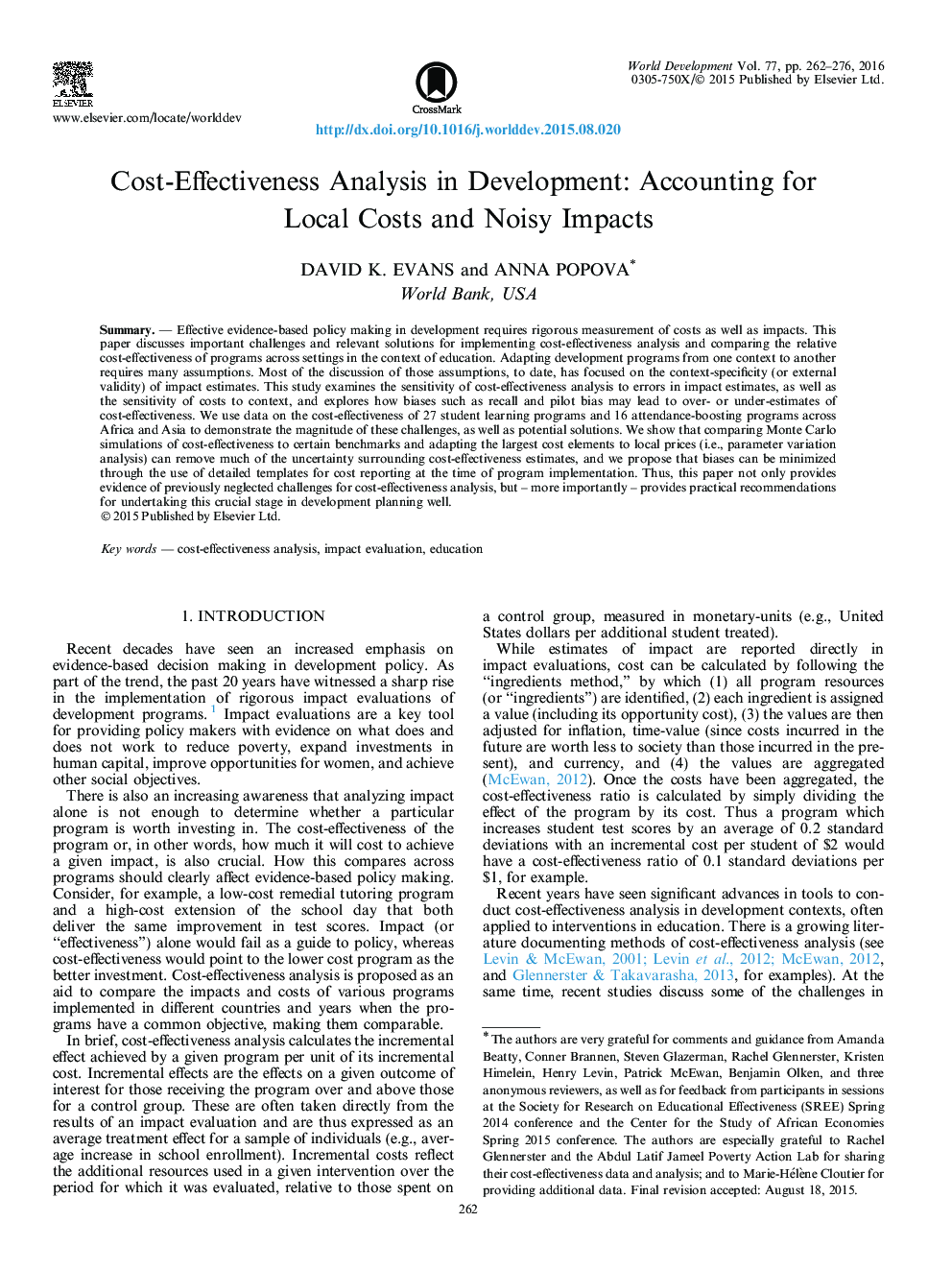| کد مقاله | کد نشریه | سال انتشار | مقاله انگلیسی | نسخه تمام متن |
|---|---|---|---|---|
| 7393210 | 1481141 | 2016 | 15 صفحه PDF | دانلود رایگان |
عنوان انگلیسی مقاله ISI
Cost-Effectiveness Analysis in Development: Accounting for Local Costs and Noisy Impacts
ترجمه فارسی عنوان
تجزیه و تحلیل هزینه-اثربخشی در توسعه: حسابداری برای هزینه های محلی و اثرات سر و صدا
دانلود مقاله + سفارش ترجمه
دانلود مقاله ISI انگلیسی
رایگان برای ایرانیان
کلمات کلیدی
تجزیه و تحلیل هزینه-اثربخشی، ارزیابی تاثیر، تحصیلات،
ترجمه چکیده
سیاست گذاری مبتنی بر شواهد موثر در توسعه مستلزم اندازه گیری دقیق هزینه ها و همچنین اثرات است. در این مقاله چالش های مهم و راه حل های مرتبط برای تحقق آن با استفاده از تجزیه و تحلیل هزینه-اثربخشی و مقایسۀ هزینه-مقرون به صرفه بودن برنامه های مختلف در تنظیمات در زمینه آموزش، مورد بحث قرار می گیرد. ادغام برنامه های توسعه از یک زمینه به دیگری نیازمند پیش فرض های بسیاری است. اغلب بحث از این مفروضات، تا به امروز، بر متن خاص (و یا اعتبار خارجی) برآوردهای تاثیر متمرکز شده است. این مطالعه حساسیت تجزیه و تحلیل هزینه - اثربخشی به اشتباهات در تخمین های تاثیر، و همچنین حساسیت هزینه ها به متن را مورد بررسی قرار می دهد و بررسی می کند که چطور اشتباهات مانند یادآوری و اختلالات خلبان ممکن است منجر به برآورد هزینه یا کم هزینه شود. ما برای ارزیابی میزان این چالش ها، و همچنین راه حل های بالقوه، از دادههای هزینه یابی 27 برنامه یادگیری دانش آموز و 16 برنامه حضور و غیاب در سراسر آفریقا و آسیا استفاده می کنیم. ما نشان می دهیم که مقایسه شبیه سازی مونت کارلو از هزینه یابی به معیارهای معینی و تطبیق بزرگترین عناصر هزینه به قیمت های محلی (به عنوان مثال تجزیه و تحلیل تغییرات پارامتر) می تواند بسیاری از عدم اطمینان در اطراف برآوردهای هزینه صرفه جویی را حذف کند، و ما پیشنهاد می کنیم که تعصبات می تواند به حداقل برسد از طریق استفاده از قالب های دقیق برای گزارش هزینه در زمان اجرای برنامه. بنابراین، این مقاله نه تنها شواهدی از چالش های پیش از غفلت را برای تجزیه و تحلیل هزینه - اثربخشی ارائه می کند بلکه - مهمتر از همه - توصیه های عملی را برای انجام این مرحله حیاتی در برنامه ریزی توسعه به خوبی می دهد.
موضوعات مرتبط
علوم انسانی و اجتماعی
اقتصاد، اقتصادسنجی و امور مالی
اقتصاد و اقتصادسنجی
چکیده انگلیسی
Effective evidence-based policy making in development requires rigorous measurement of costs as well as impacts. This paper discusses important challenges and relevant solutions for implementing cost-effectiveness analysis and comparing the relative cost-effectiveness of programs across settings in the context of education. Adapting development programs from one context to another requires many assumptions. Most of the discussion of those assumptions, to date, has focused on the context-specificity (or external validity) of impact estimates. This study examines the sensitivity of cost-effectiveness analysis to errors in impact estimates, as well as the sensitivity of costs to context, and explores how biases such as recall and pilot bias may lead to over- or under-estimates of cost-effectiveness. We use data on the cost-effectiveness of 27 student learning programs and 16 attendance-boosting programs across Africa and Asia to demonstrate the magnitude of these challenges, as well as potential solutions. We show that comparing Monte Carlo simulations of cost-effectiveness to certain benchmarks and adapting the largest cost elements to local prices (i.e., parameter variation analysis) can remove much of the uncertainty surrounding cost-effectiveness estimates, and we propose that biases can be minimized through the use of detailed templates for cost reporting at the time of program implementation. Thus, this paper not only provides evidence of previously neglected challenges for cost-effectiveness analysis, but - more importantly - provides practical recommendations for undertaking this crucial stage in development planning well.
ناشر
Database: Elsevier - ScienceDirect (ساینس دایرکت)
Journal: World Development - Volume 77, January 2016, Pages 262-276
Journal: World Development - Volume 77, January 2016, Pages 262-276
نویسندگان
David K. Evans, Anna Popova,
